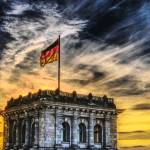Ready to make your travel business dreams come true in Germany? Keep reading our guide to find all the answers you need.

Germany is a popular tourist destination for people all over the world because of its fascinating history, beautiful scenery, and vibrant cities. From the enchanting fairytale castles along the Romantic Road to the bustling streets of Berlin, Germany offers diverse experiences for tourists.
Germany, located at the very center of Europe, boasts a stunning landscape encompassing lush forests, picturesque lakes, and the majestic Alps in the south. Germany is celebrated for its contributions to the world of art, science, and technology, as it’s the birthplace of renowned composers like Beethoven and Bach, and home to pioneering automobile manufacturers such as Mercedes-Benz and BMW.
With a history that has witnessed the fall of the Berlin Wall and the reunification of East and West Germany, this nation is a testament to resilience and transformation, making it a prime destination for travelers seeking a remarkable journey through both time and culture.
If you’re passionate about travel and dream of starting your own travel business, then Germany is going to be the perfect destination for you. In this comprehensive guide, we’ll explore top tips on launching a travel business in Germany, supported by relevant statistics and insights. From understanding the German travel market to creating a business entity, we’ll navigate the steps to guide you on your rewarding journey.
Understanding the German Travel Market
The key to your business endeavor is having a solid understanding of the German tourism market. Germany attracts millions of tourists annually, making it one of the most attractive travel destinations. Recognize new trends and preferences to customize your services, such as eco-friendly travel, wellness retreats, and cultural experiences.
Millions and millions of tourists arrive in Germany every year, with around 35.7 million overnight stays in 2022 alone. Try and find out as much about the current state of the German tourism market as you can before you make any integral decision. Analyze the competitive landscape in Germany’s travel sector. Understand the market’s size and the scope of opportunities it presents.
Market Research and Planning
Before you set off on your quest to start a travel business in Germany, it’s essential to conduct thorough market research. Germany boasts a thriving tourism industry, catering to various interests, including cultural exploration, adventure, and luxury travel. Therefore, it’s crucial to identify your target audience. Are you focusing on solo travelers, families, or niche interests like eco-tourism or culinary adventures? This diversity means you can find your niche within Germany’s tourism landscape.
Create a Business Plan
Once you’ve defined your target market, create a comprehensive business plan. Your plan should outline your business objectives, budget, and marketing strategies. A well-structured plan is your roadmap to success in the competitive travel industry.
Executive Summary:
Begin with an executive summary that provides a concise overview of your travel business. Include your mission statement, vision, and a brief description of your services.
Company Description:
Provide a detailed description of your travel agency. Explain your business’s history, the inspiration behind it, and the specific services you plan to offer.
Market Research:
Conduct thorough market research to understand the German travel industry. Identify your target market, including demographics, preferences, and interests.
Business Objectives and Goals:
Clearly define your business objectives and set measurable goals. Outline both short-term and long-term targets, such as the number of clients you aim to serve, revenue projections, and expansion plans.
Legal and Regulatory Requirements:
Outline the legal and regulatory aspects of starting a travel business in Germany. Specify the licenses, permits, and insurance required to operate legally.
Organizational Structure:
Describe your travel agency’s organizational structure. If applicable, describe the duties and responsibilities of the important team members. Include details about the training and experience of your management staff.
Location and Infrastructure:
Detail your business location, whether it’s a physical office, a virtual office, or a combination of both. Explain your rationale for choosing this location and how it aligns with your business strategy.
Marketing and Promotion:
Develop a comprehensive marketing plan. Define your brand identity, marketing channels (e.g., social media, website, email marketing), and advertising strategies.
Operational Plan:
Outline your day-to-day operations, including booking and reservation processes, customer service procedures, and any technology or software you’ll use to streamline operations.
Financial Plan:
Create a detailed financial plan that covers startup costs, operational expenses, revenue projections, and profit margins.
Legal and Regulatory Requirements
To operate legally in any country, you’ll need to obtain the necessary licenses and permits. These requirements can vary depending on the type of travel services you offer, so it’s vital to research and comply with all relevant regulations. Similarly, in Germany, travel agencies must adhere to specific regulations and obtain licenses to operate legally.
Financial Management
It’s not just about booking flights and accommodations; it’s about ensuring the financial health and sustainability of your venture, because, ultimately, the goal of all businesses is to generate profits. To achieve this, you must create a detailed and well-structured financial plan. Your financial plan should encompass all aspects of your travel business, from initial startup costs to ongoing expenses.

Startup Costs: Identify the initial investments required to launch your travel business. This includes licensing and registration fees, website development, office setup (if applicable), and any marketing and promotional expenses.
Operational Costs: List your ongoing expenses, such as salary, utilities, office rent (if necessary), insurance premiums, and software subscriptions for reservation and booking systems.
Marketing Budget: Allocate a portion of your budget to marketing and advertising. This includes expenses related to online advertising, content creation, social media management, and any partnerships or collaborations with tourism providers.
Revenue Projections: Estimate your expected revenue based on your pricing strategy, target market, and projected sales. Be careful and realistic in your estimates to ensure financial stability.
Contingency Fund: Set aside a portion of your budget for unexpected expenses or economic downturns. During difficult times, having a cash buffer can be really helpful.
Location and Infrastructure
Whether you choose to have a physical office or establish a strong online presence, your business location matters.
Selecting the Perfect Physical Location:
If you opt for a physical office, location becomes a critical factor. Consider the following:
- Accessibility: Choose a location easily accessible to potential clients. Being in or near tourist hubs, city centers, or close to transportation hubs like airports or train stations can enhance your visibility.
- Local Networking Opportunities: Proximity to other travel-related businesses, such as hotels, restaurants, or tour operators, can facilitate collaborations and networking opportunities and increase the chances of getting more business.
Embracing the Digital Age
In today’s digital age, a well-designed website is essential, whether or not you have a physical office. Here’s why:
Your Digital Storefront: Think of your website as your digital storefront, open 24/7. It’s the first place potential clients go to explore your services.
Visual Appeal: Invest in a visually appealing website that showcases your services and highlights the beauty and charm of Germany.
User-Friendly Design: Make sure your website is user-friendly, with simple navigation and concise information. Highlight your services, itineraries, and contact details prominently.
Streamlining Operations and Technology
Efficiency is key in the travel business. To streamline your operations, consider the following:
Efficient Booking and Reservation System: Invest in a state-of-the-art booking and reservation system. This simplifies the booking process for your clients and minimizes the risk of overbooking and administrative errors.
24/7 Accessibility: In a globalized world, clients might want to book at any time. An online booking system allows for round-the-clock accessibility, catering to different time zones.
Partnerships and Networking
Building connections with local hotels, transportation providers, and tourist attractions can be highly beneficial for your travel agency. Collaborating with these businesses can lead to exclusive deals and a competitive edge over other businesses in the tourism sector. Additionally, networking with fellow travel professionals and joining industry associations can provide valuable insights and opportunities for growth.
Marketing and Promotion
Your travel agency’s success in Germany depends on how effective your marketing is. Let’s take a look at certain measures you can take in this aspect:
Online Presence: Maintain active social media accounts and a user-friendly website to create a strong online presence. Share captivating images of German destinations, travel tips, and engaging content to attract potential customers.
Search Engine Optimization (SEO): Optimize your website for search engines to improve visibility. Use keywords related to German travel to appear higher in search results.
Email Marketing: Build a mailing list and send out newsletters with travel updates, special offers, and valuable information to keep your audience engaged.
Content Marketing: Create informative and engaging content that showcases your expertise. Write blogs about top destinations in Germany, travel itineraries, or cultural insights.
Paid Advertising: Invest in pay-per-click (PPC) advertising campaigns on platforms like Google Ads and Facebook to reach a wider audience.













